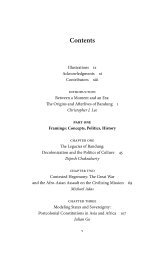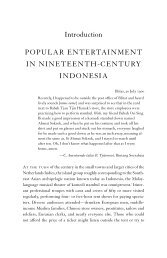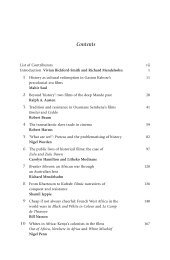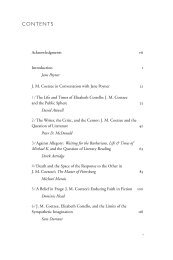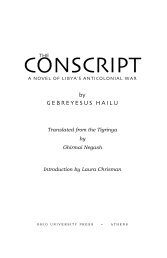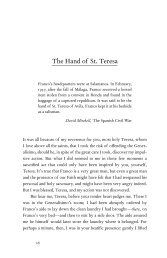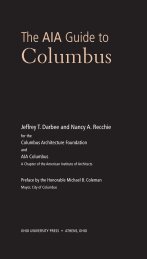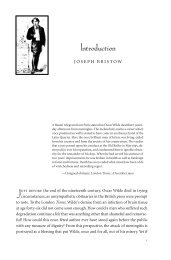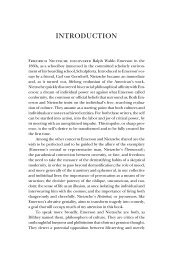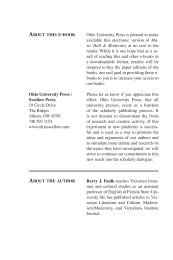Race, Revolution, and the Struggle for Human Rights in Zanzibar ...
Race, Revolution, and the Struggle for Human Rights in Zanzibar ...
Race, Revolution, and the Struggle for Human Rights in Zanzibar ...
Create successful ePaper yourself
Turn your PDF publications into a flip-book with our unique Google optimized e-Paper software.
<strong>and</strong> assert or ma<strong>in</strong>ta<strong>in</strong> <strong>the</strong>ir dom<strong>in</strong>ance as about how <strong>and</strong> why <strong>in</strong>dividuals,<br />
as autonomous moral agents, exercise power to ei<strong>the</strong>r promote or<br />
violate human rights. Hamad’s version of human rights is anyth<strong>in</strong>g but<br />
cont<strong>in</strong>gent; though <strong>in</strong><strong>for</strong>med by <strong>the</strong> village norms of his youth, it is not<br />
parochial. It resists subord<strong>in</strong>ation to ei<strong>the</strong>r <strong>the</strong> power of a revolutionary<br />
agenda or claims <strong>for</strong> justice by a community that has historically been<br />
excluded <strong>and</strong> enslaved. His version of human rights is guided <strong>in</strong>stead by<br />
<strong>the</strong> view that Islam teaches a set of ethical st<strong>and</strong>ards that apply to politics:<br />
<strong>in</strong> his account, Hamad repeatedly refers to <strong>the</strong> alleged deceit, folly,<br />
<strong>and</strong> foul play of his rivals—<strong>and</strong> <strong>the</strong>ir <strong>the</strong>ft of elections—as violations of<br />
a community’s trust <strong>and</strong> as offensive to God.<br />
One of Hamad’s arguments aga<strong>in</strong>st <strong>the</strong> revolution is that it provided<br />
a language <strong>and</strong> view of history through which men could <strong>and</strong> did set<br />
aside Islamic ethical st<strong>and</strong>ards, not to mention codes of human rights;<br />
when African nationalists view politics as a “racial war of nerves,” <strong>the</strong>y<br />
obscure any ethical component of elite decision mak<strong>in</strong>g. For Hamad, <strong>the</strong><br />
only way <strong>for</strong> isl<strong>and</strong>ers to move <strong>for</strong>ward from <strong>the</strong>ir traumatic memories<br />
of <strong>the</strong> past <strong>and</strong> to end <strong>the</strong> divisive politics of race is to remember <strong>and</strong><br />
commonly embrace Islamic sensibilities that speak to <strong>the</strong> worth<strong>in</strong>ess of<br />
an <strong>in</strong>dividual—<strong>and</strong> a community—more than do labels of race, ethnicity,<br />
or class. In this way, Hamad employs a language of virtues <strong>and</strong> vices,<br />
confident of its explanatory power. He remembers his life story as a mission<br />
to conv<strong>in</strong>ce leaders to apply Islamic notions of decency <strong>and</strong> civility<br />
to political <strong>in</strong>stitutions derived largely from Western experience. Hamad’s<br />
memoir, thus, illustrates how democracy <strong>and</strong> human rights can be<br />
streng<strong>the</strong>ned ra<strong>the</strong>r than weakened by appeals to Islam <strong>and</strong> how Islam<br />
can be employed to realize <strong>the</strong> European humanist revolution better<br />
than some of its ideological descendants.<br />
cosmopolitanism<br />
A guidebook published by <strong>Zanzibar</strong>’s colonial government <strong>in</strong> 1931 noted,<br />
“The population of <strong>the</strong> Protectorate (235,428) is one of <strong>the</strong> most cosmopolitan<br />
<strong>in</strong> <strong>the</strong> world <strong>and</strong> <strong>the</strong>re are few races of which representatives<br />
may not be found <strong>in</strong> <strong>the</strong> two isl<strong>and</strong>s.” 35 For over a millennium prior to<br />
<strong>the</strong> 1930s, <strong>Zanzibar</strong> figured as a small part of a vast Indian Ocean world<br />
of trade, monsoons, <strong>and</strong> Islam that had fostered a nearly un<strong>in</strong>terrupted<br />
flow of goods <strong>and</strong> people across <strong>the</strong> sea <strong>and</strong> at least three cont<strong>in</strong>ents.<br />
This world was multicultural <strong>and</strong> multil<strong>in</strong>gual; it produced a number of<br />
diasporas <strong>and</strong> a patchwork of ethnic enclaves <strong>in</strong> isl<strong>and</strong>s <strong>and</strong> port cities<br />
along its ocean rim. Along <strong>the</strong> coast of East Africa, Arab <strong>and</strong> Persian<br />
Cosmopolitanism <strong>and</strong> Its Discontents 15



